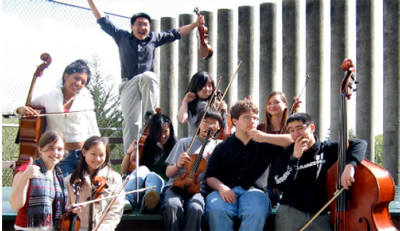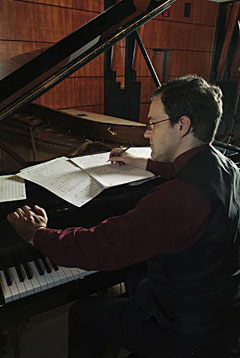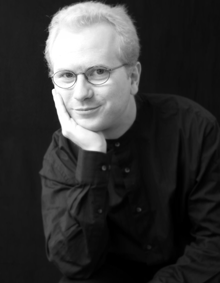As those of you who come round here regularly know, I’m not a composer or musician but I am an experienced listener with limited patience for things that take too long to get to the point. As a practical matter, that means that music I’ve never heard before has about 30 seconds to grab my attention. I’ll listen to the whole thing but if doesn’t have that “Holy shit” thing happening in the first few bars, chances are the earth is never going to move for me. Call it the Jerry Principle: musical masterpieces announce their masterpiece-ness in 16 bars or less. Go ahead, prove me wrong.
Most years you’re lucky to hear for the first time one or two compositions that grab you by the throat and won’t let go but in the last couple of weeks, I have encountered three such pieces.
 First, there is a new large-scale cantata called Athanor by the 35-year-old French composer Guillaume Connesson, about whom I know little, except that he is obviously not a spectralist. Based on an allegorical theme that somehow involves alchemy (the French are tedious with their obligatory intellectual pretentions) Athanor is relentlessly tonal and dramatic, recalling the heyday of the big bold orchestrators like Vaughn Williams and Prokofiev. It is uncool to mention Carl Orff these days but Connesson has that kind of dramatic flair and wastes no time in making it apparent. Supernova for orchestra, the second piece on the CD, confirms his gift for orchestral drama.
First, there is a new large-scale cantata called Athanor by the 35-year-old French composer Guillaume Connesson, about whom I know little, except that he is obviously not a spectralist. Based on an allegorical theme that somehow involves alchemy (the French are tedious with their obligatory intellectual pretentions) Athanor is relentlessly tonal and dramatic, recalling the heyday of the big bold orchestrators like Vaughn Williams and Prokofiev. It is uncool to mention Carl Orff these days but Connesson has that kind of dramatic flair and wastes no time in making it apparent. Supernova for orchestra, the second piece on the CD, confirms his gift for orchestral drama.
The second piece is not that new but I just heard it for the first time– Kaja Saariho’s Graal théâtre, for violin & orchestra. IMHO, as the kids say online, this the first absolute violin concerto masterwork to come along since Berg, or maybe Barber. Gideon Kremer reaches deep into his considerable bag of tricks for every possible sound (and some that are clearly impossible). The rest of the CD is also marvelous–Dawn Upshaw sings the 5-song set Chateau de L’ame beautifully and Amers, for cello & electro-acoustic ensemble is a suitably gnarly antidote to L’ame’s sweetness. But, Graal théâtre is one for the ages.
Kaja Saariho’s Graal théâtre, for violin & orchestra. IMHO, as the kids say online, this the first absolute violin concerto masterwork to come along since Berg, or maybe Barber. Gideon Kremer reaches deep into his considerable bag of tricks for every possible sound (and some that are clearly impossible). The rest of the CD is also marvelous–Dawn Upshaw sings the 5-song set Chateau de L’ame beautifully and Amers, for cello & electro-acoustic ensemble is a suitably gnarly antidote to L’ame’s sweetness. But, Graal théâtre is one for the ages.
 And while we are waving red flags, is there a single note of Osvaldo Golijov that is not destined for immortality? His latest bid for the magic ring is Oceana, an impossibly beautiful setting of a poem by Pablo Neruda for guitars, percussions, chorus, and solo vocalists–in this case, the wonderful sambanista Luciana Souza. Easy listening World Music, you say? Phooey, I say. Most composers would kill to have written Oceana or the other pieces on the CD–Tenebrae, a two-movement meditation on sadness written for the Kronos Quartet or the Three Songs written for Dawn Upshaw.
And while we are waving red flags, is there a single note of Osvaldo Golijov that is not destined for immortality? His latest bid for the magic ring is Oceana, an impossibly beautiful setting of a poem by Pablo Neruda for guitars, percussions, chorus, and solo vocalists–in this case, the wonderful sambanista Luciana Souza. Easy listening World Music, you say? Phooey, I say. Most composers would kill to have written Oceana or the other pieces on the CD–Tenebrae, a two-movement meditation on sadness written for the Kronos Quartet or the Three Songs written for Dawn Upshaw.
Gramophone’s reviewer quotes an unnamed New York critic (was it you, Alex?) as saying that Golijov’s fans are just waiting for him to write a Very Important Work that will put him in the league with John Adams. Speaking as someone who has hung on every note since my first spirtually-awakening discovery of The Dreams and Prayers of Issac the Blind, that wait was over a long time ago.

 Kaja Saariho’s Graal théâtre, for violin & orchestra. IMHO, as the kids say online, this the first absolute violin concerto masterwork to come along since Berg, or maybe Barber. Gideon Kremer reaches deep into his considerable bag of tricks for every possible sound (and some that are clearly impossible). The rest of the CD is also marvelous–Dawn Upshaw sings the 5-song set Chateau de L’ame beautifully and Amers, for cello & electro-acoustic ensemble is a suitably gnarly antidote to L’ame’s sweetness. But, Graal théâtre is one for the ages.
Kaja Saariho’s Graal théâtre, for violin & orchestra. IMHO, as the kids say online, this the first absolute violin concerto masterwork to come along since Berg, or maybe Barber. Gideon Kremer reaches deep into his considerable bag of tricks for every possible sound (and some that are clearly impossible). The rest of the CD is also marvelous–Dawn Upshaw sings the 5-song set Chateau de L’ame beautifully and Amers, for cello & electro-acoustic ensemble is a suitably gnarly antidote to L’ame’s sweetness. But, Graal théâtre is one for the ages.

 The
The 
 First Jeff Harrington, then David Salvage, and now our very own
First Jeff Harrington, then David Salvage, and now our very own  For the past 27 years, the Mexican-born pianist and composer
For the past 27 years, the Mexican-born pianist and composer  Attention Boston (and NY) shoppers! The world-premiere run of David Salvage’s String Quartet No. 2 is at hand. The
Attention Boston (and NY) shoppers! The world-premiere run of David Salvage’s String Quartet No. 2 is at hand. The